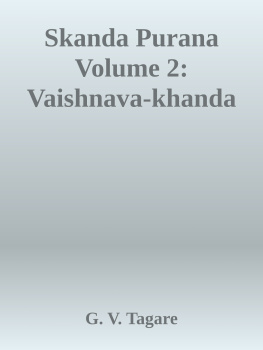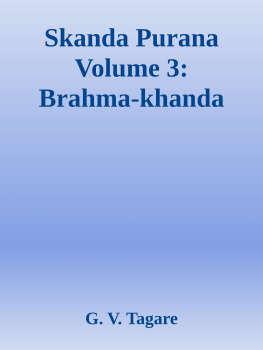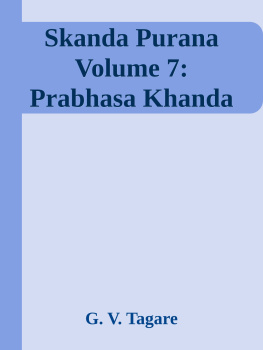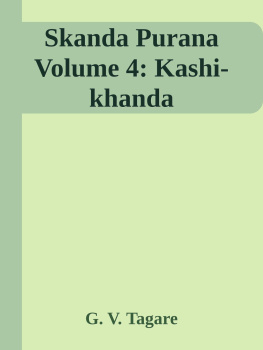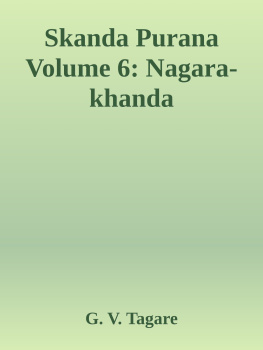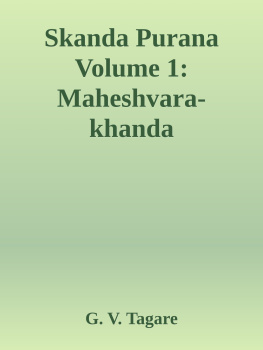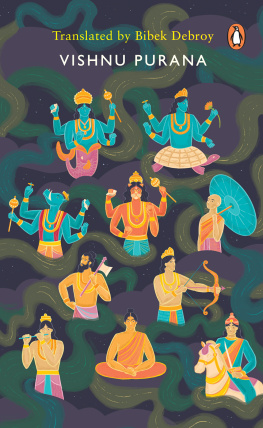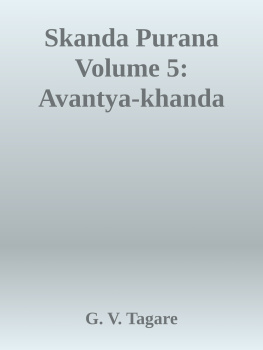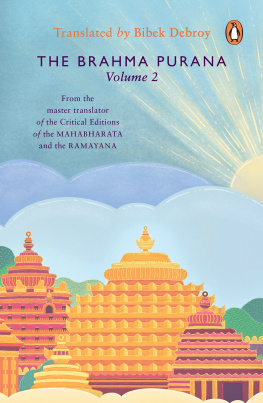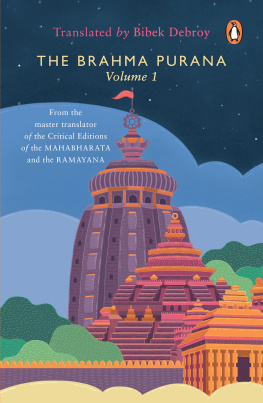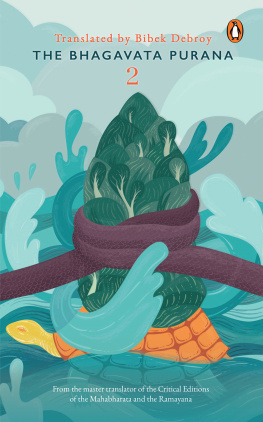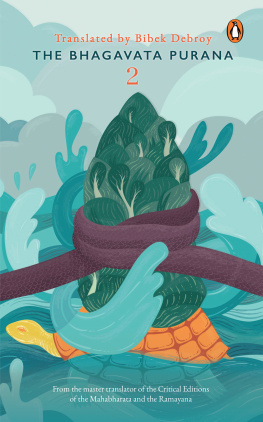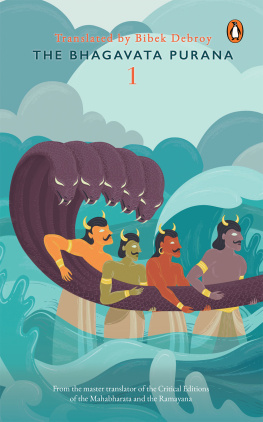G. V. Tagare - Skanda Purana Volume 2: Vaishnava-khanda
Here you can read online G. V. Tagare - Skanda Purana Volume 2: Vaishnava-khanda full text of the book (entire story) in english for free. Download pdf and epub, get meaning, cover and reviews about this ebook. genre: Religion. Description of the work, (preface) as well as reviews are available. Best literature library LitArk.com created for fans of good reading and offers a wide selection of genres:
Romance novel
Science fiction
Adventure
Detective
Science
History
Home and family
Prose
Art
Politics
Computer
Non-fiction
Religion
Business
Children
Humor
Choose a favorite category and find really read worthwhile books. Enjoy immersion in the world of imagination, feel the emotions of the characters or learn something new for yourself, make an fascinating discovery.
- Book:Skanda Purana Volume 2: Vaishnava-khanda
- Author:
- Genre:
- Rating:4 / 5
- Favourites:Add to favourites
- Your mark:
- 80
- 1
- 2
- 3
- 4
- 5
Skanda Purana Volume 2: Vaishnava-khanda: summary, description and annotation
We offer to read an annotation, description, summary or preface (depends on what the author of the book "Skanda Purana Volume 2: Vaishnava-khanda" wrote himself). If you haven't found the necessary information about the book — write in the comments, we will try to find it.
Skanda Purana Volume 2: Vaishnava-khanda — read online for free the complete book (whole text) full work
Below is the text of the book, divided by pages. System saving the place of the last page read, allows you to conveniently read the book "Skanda Purana Volume 2: Vaishnava-khanda" online for free, without having to search again every time where you left off. Put a bookmark, and you can go to the page where you finished reading at any time.
Font size:
Interval:
Bookmark:
This page describes Venkatacala-mahatmya which is section 1 of the English translation of the Skanda Purana, the largest of the eighteen Mahapuranas, preserving the ancient Indian society and Hindu traditions in an encyclopedic format, detailling on topics such as dharma (virtous lifestyle), cosmogony (creation of the universe), mythology (itihasa), genealogy (vamsha) etc.
The Vekacalamhtmya (.
This page describes Naradas Vision of Yajnavaraha (Stationed on the Peak of Sumeru) which is chapter 1 of the English translation of the Skanda Purana, the largest of the eighteen Mahapuranas, preserving the ancient Indian society and Hindu traditions in an encyclopedic format, detailling on topics such as dharma (virtous lifestyle), cosmogony (creation of the universe), mythology (itihasa), genealogy (vamsha) etc. This is the first chapter of the Venkatacala-mahatmya of the Vaishnava-khanda of the Skanda Purana.
[]
Note: .
1. In the holy forest called (Sacrificial Session) of twelve years duration for the protection of the world.
2. A sage of great intellect, named , approached them.
3. Duly honoured and adored by them, .
4. He narrated in detail the account of creation, annihilation (of the universe), genealogy, histories of dynasties of kings, lineage of sages and the details of
5. On hearing the stories of the greatness and powers of the holy places those leading sages spoke to Sta of perfect self-control with a desire to listen to the stories.
6. O omniscient son of Romaharaa, well-versed in the Puric lore, we wish to hear about the greatness of the prominent mountains on the surface of the earth. O highly fortunate sage, tell us what are the important mountains.
7. Formerly on the banks of the river ) I asked Vysa, the most excellent one among great sages, this very question. He, the most excellent one of my preceptors, said to me:
8-13. Formerly, in the divine (the minaret or a lofty towered gate at the gateway) had seven storeys. It was rendered splendid by means of two panels of doors made of brilliant diamonds.
14. After entering it he saw a divine pearl-set platform within. The great sage climbed on to the lofty dais set with lapis lazuli.
15. In its middle he saw an exceedingly lustrous throne that was unequalled (in workmanship) and very high. It had eight brilliant legs and was studded with pearls.
16. In its middle there was a divine lotus lovely and splendid with a thousand petals. It was white and resembled a thousand moons in beauty and splendour. It sparkled exceedingly with its pericarp and filaments.
17. In its middle he saw a beautiful being in the form of a man as huge as the mountain. He had a brilliance of ten thousand full moons. He was seated within the lotus.
18. He had four arms and highly magnificent limbs. He had the splendid face of a boar. The excellent had a conch and a discus (in two hands) and held (the other two) in gestures of granting boons and immunity from fear.
19. He wore yellow garments. The Lord with long eyes resembling lotuses had a gentle face resembling the full moon. His lotus-like face had the fragrance of incense.
20. The sound of Milk Ocean. A crown enhanced the brilliant splendour of his face.
21. He had the jewel.
22. He was bedecked in divine ornaments of gold studded with excellent gems and jewels. He was as sparkling as the autumnal cloud overspread with clusters of lightning streaks.
23. With the sole of his left foot placed on a footstool he constantly shone brilliantly with ornaments like bangles, armlets, bracelets and ear-rings.
24. Day and night, he was attended upon by Brahm and the leading sages, and many others.
25-26. He was served and attended upon by . Extremely delighted Nrada stood near the Lord.
[The Arrival of Goddess Earth to the Presence of ]:
27-29. In the meantime there arose the sound of the divine grass. She was adorned in all ornaments.
30-33. She was accompanied by her friends Il and . Then (Goddess) Earth scattered at the feet of Lord r Varha a (big) collection of flowers brought by them. Then she bowed down to the Lord of the Chiefs of Devas and stood there with palms joined in reverence. r Varha embraced that Goddess and placed her in his lap. With his mind exceedingly pleased the Lord enquired about the happiness and welfare of Earth.
[Dialogue between Earth and Varha]:
34. O Goddess Earth, I established you on the delightfully pleasing head of . I placed the world (people) on you with the mountains as your assistants. Thereafter I came here, O gentle lady. Why have you come here yourself?
35-36. You lifted me up from the nether worlds and made me stable and steady on the (head) of Aanta splendid with a thousand hoods, as if on a high pedestal studded with jewels and precious stones. O Lord, you placed the mountains capable of sustaining me as my assistants. O , they are holy and identical with you. Now, O mighty one, tell me about the chief ones among them, who are my supports.
[The Description of s Excellence Among all Mountains]:
37-41. O . These have been served (i.e. resorted to) by me, by groups of Devas and by those of sages.
O , I shall describe the chief ones among these accurately. Listen:
Slagrma, Sihdri and the leading mountain Gandhamdanathese excellent mountains, O Goddess, have occupied the quarter of Himavn (i.e. the north). O Vasundhar, I shall name the mountains famous in the south.
42. Arudri, Hastiaila, Gdhrdri and Ghaikcalaall these excellent mountains are near Kr river.
43. To the north of Hastiaila, five Yojanas (i.e. 60 km) away, is the river the most excellent one among all the rivers.
44. On its northern bank is the excellent lake named .
45. (recluses) and groups of sages.
46. In an excellent forest to the north of the lake named Kamala is the great abode of (i.e. 2 x 3 = 7 km) (i.e. its distance from the lake was 7 km).
47-48. The leading mountain was one high (12 km) and extended to seven Yojanas (84 km). O Goddess, it is golden and very long with ridges abounding in gems and jewels.
On that mountain the following always reside: groups of Devas beginning with Indra, leading sages beginning with Vasiha, and groups of celestial damsels beginning with Rabh.
49. perform penance there. The rivers there, occupied by these, yield merits on being visited. O Mdhav, there are many divine lakes too here.
50-52. (A description of the pre-eminence of Svmipukari among all the and Svmipukari. They say that these seven Trthas are the most excellent ones on the splendid Nryaagiri. The splendid Svmipukari is the most excellent one among these.
53. I dwell with you on the western bank of this. On its southern bank dwells , the Lord of the universe.
54-55. O Earth having the oceans for your robes, it is on a par with all the Trthas beginning with Gag.
O Earth, Svmisarovara (i.e. Svmipukari) has attained the leadership of all the Trthas in the three worlds including both lakes and rivers. All the Trthas reside on this divine mountain in order to serve the sacred Svmipukari. I shall mention their number to you.
56. There are sixty-six crores of Trthas on this excellent sacred mountain, O Vasundhar, and among them six Trthas are extremely prominent.
Font size:
Interval:
Bookmark:
Similar books «Skanda Purana Volume 2: Vaishnava-khanda»
Look at similar books to Skanda Purana Volume 2: Vaishnava-khanda. We have selected literature similar in name and meaning in the hope of providing readers with more options to find new, interesting, not yet read works.
Discussion, reviews of the book Skanda Purana Volume 2: Vaishnava-khanda and just readers' own opinions. Leave your comments, write what you think about the work, its meaning or the main characters. Specify what exactly you liked and what you didn't like, and why you think so.

